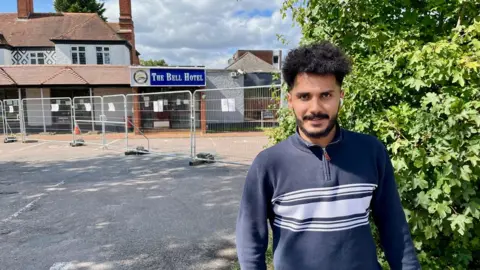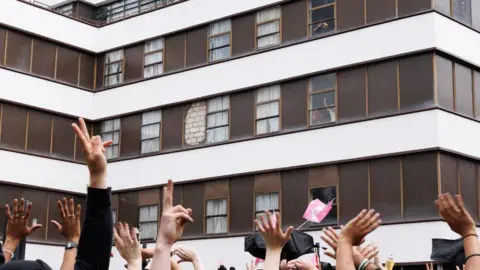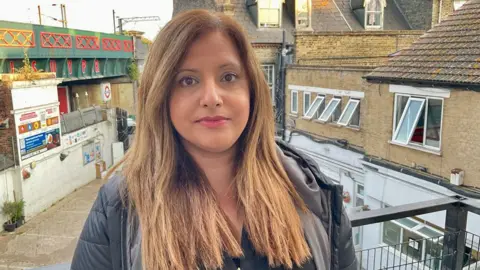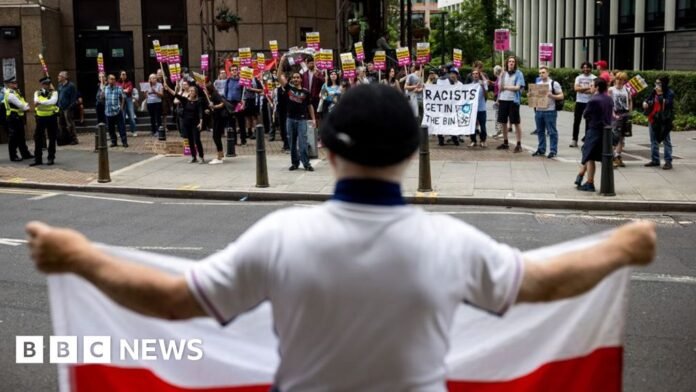Correspondent, BBC News
 Carl Court/Getty Images
Carl Court/Getty Images“We are not happy with these men in this hotel because we fear for our children,” Orla Minihane tells me. “If that makes me far right then so be it.”
Orla has lived near Epping since she was a child and describes herself as a “very boring woman who has worked in the City of London for 25 years”. Last year she joined Reform UK and hopes to stand as a local candidate for the party.
On a busy road leading to the Essex town, The Bell Hotel, now fortified, is one of more than 200 across the country where the government houses asylum seekers.
In the last month, a series of protests, usually several hundred people at a time but sometimes thousands, have taken place against the use of hotels for asylum seekers. About 20 more were planned for Friday and Saturday this week.
The latest round of demonstrations began at the 80-room Bell in July, after a man living in the hotel was arrested, and subsequently charged, with sexual assault, harassment and inciting a girl to engage in sexual activity. Hadush Kebatu, 41, from Ethiopia, has denied the offences and is in custody.
The case has sparked a wider conversation about the effect of housing dozens of asylum seekers in hotels in communities across Britain.
“Before there were women and children in the hotel – there was a little bit of crime, most people got on with it,” Orla says. “But now it’s the fact that it’s all men. It’s not a balanced culture.”

The protests have been promoted on social media under red, white and blue banner text with slogans such as “Protect Our Community”, “Safety of Women and Children Before Foreigners” and “All Patriots Welcome”.
We have identified far-right activists at some of the protests and activists who oppose them are watching what is happening closely.
The activist group Stand Up To Racism sees this as far-right organisations “stirring up racist violence” and trying to repeat the violence that flared after the murders of three young girls in Southport.
However, the protests are often organised by people with little experience of street campaigning, including mothers with families and professional careers, like Orla. That they are getting involved suggests that in some communities, with hotels close by, there is a shift in the public mood about Britain’s asylum hotels.
Outside The Bell, which is surrounded by steel fencing and guarded by a 24/7 security team, one of its residents, Wael, from Libya, is a year into his asylum claim and waiting for his fourth Home Office interview.

“I spoke with one of the protesters,” Wael says. “Everything’s good. Epping is nice. We can sit and stay. People respect us.
“I want to learn English and work. In a car wash or something. I will not stay here and take food. I have a dream – to make money and play football and have fun with my time. It’s a small dream.”
Wael is happy to talk, give his name and have his picture taken. But two other young Iraqi Kurds who are staying at The Bell, and allowed to freely come and go, are more cautious and less positive.
They tell me a gang of youths in masks and on motorbikes, has just shouted expletives at them. Shortly afterwards I catch sight of the bikers nearby.
One of the asylum seekers says that living in a hotel room 24 hours a day is messing with his mind. When I ask about their dealings with the Home Office they hurry inside The Bell.
Shortly afterwards a passing driver yells, “Burn it down”.
Last summer, in the wake of the murders of three young girls by a teenager in Southport, Merseyside, that is what some protesters tried to do at other hotels.
This summer, there have been isolated clashes, when activists on each side of the argument, anti-fascists and hard-right, have faced each other, or the police.
Often the migrants have watched from the sidelines, penned up behind the fencing, or filming from upstairs windows.
 Dan Kitwood/Getty Images
Dan Kitwood/Getty ImagesThe police have largely kept control, sometimes facing criticism for their methods, including the false claim that Essex Police used buses to transport pro-migrant activists to a protest in Epping. For now, arrest numbers are way below those in 2024.
I ask Orla, who made an impassioned speech at a recent protest, why she is so aggrieved by the asylum hotel.
She says friends have described their daughters being “grabbed” by young, non-white men in the area. She has seen shoplifting, she says, in the local Marks & Spencer.
“Everyone knows they are asylum seekers,” Orla says, “Epping is very white.”
She adds of the hotel’s occupants: “You know they are coming for freebies and when they come here they abuse the privilege. It’s ridiculous.”
Asylum seekers would say they are seeking protection by coming to the UK, although some are ultimately judged not to be eligible for asylum status.
Last month Stand Up To Racism claimed Orla had shared a stage with an alleged member of a neo-Nazi group at a hotel protest. She told BBC News she had “no idea” who he was, and he says he has since left the group.

Asylum seekers are not normally allowed to work in the UK. Successive governments have judged that paying for their accommodation and food is preferable to allowing them to compete with British workers in the jobs market, offering an incentive to come here.
In June, the government warned some asylum seekers may be illicitly working as food delivery drivers.
Sixteen miles south of Epping, residents in Canary Wharf, east London, live in gleaming glass towers and traditional East End houses alongside another asylum hotel. It is a very different place but many locals share similar opinions.
Asylum seekers recently arrived during the small hours at the wharf-side four-star Britannia International – 610 rooms, but, according to a maintenance engineer, no longer the “luxury hotel” described in some reports. Rumours that they were coming triggered protests by local residents, many of them office workers in the Canary Wharf business district.
Outside the hotel, Chengcheng Cul, who is Chinese, draws a distinction between his “legal migration” to the UK, and “illegal asylum seekers”.
“If people can come over the Channel illegally, and easily, what encourages decent people to come legally, pay their tax and get involved in this society? Is this setting a good example? This country has opened the border to illegal migrants.”
Lorraine Cavanagh, who works for charities on the Isle of Dogs, echoes the concerns in Epping. “I don’t know who they are.
“They are unidentified men who can walk around and do what they want to do with no consequences,” she says.
That comment, “I don’t know who they are”, lies at the heart of the opposition to asylum seekers in these communities.
 Jack Taylor/Getty Images
Jack Taylor/Getty ImagesIt can be very hard to establish basic facts about the young men in the hotels, the system that put them there, or the impact they might have on locals.
While growing in number, asylum seekers who come by small boats across the English Channel are a small proportion of total immigration to the UK, and in 2024, just over a third of all asylum seekers.
The government’s contracted out the task of accommodating them to three companies: Serco, Clearsprings and Mears. They buy up rooms in houses and in hotels, usually taking them over completely.
Ministers regularly talk about their ambition to “smash the gangs”, but say less about the hotels. The government won’t confirm where they are because of concerns they might be attacked.
Madeleine Sumption from the Migration Observatory points out there is a problem publishing information about small groups of asylum seekers when it might identify them by age or sex, a long-standing approach for public bodies.
We know how many hotel places are being used in each region – the vast majority are in the south of England. They cost £5.77m a day for the government to provide. The estimated cost over the decade to 2029 has spiralled from £4.5bn in 2019 to £15.3bn.
But there are no specific figures for the age and sex of hotel occupants, no details about their countries of origin, or their claim for sanctuary in the UK.
So when local communities allege crime rates go up when asylum hotels are opened, or raise fears about the hotels being full of only single adult males, it is often impossible to prove the point either way.
There were 35 sexual and violent offences reported in Epping town in May. In the same month, the year before, when there were no asylum seekers at The Bell, 28 sexual and violent offences were reported. In May 2023, the hotel was being used by the Home Office for migrant families. The number of reported offences was 32.
But how many of these offences involved asylum seekers? The police do not publish statistics about exactly where crimes happen or who is reported to have committed them.
So in many ways, we don’t know “who they are”.
Orla believes more information would help reduce tension and is furious at the government’s handling of the asylum system.
“If you conceal the truth and you act as if you are hiding something, people are going to be angry,” she says. “If they said there are 70 in the Bell Hotel, five are from Sudan, five from somewhere else, I think most people would feel better.”
Epping Forest District Council’s Conservative Leader, Chris Whitbread recently said that “it is important to be transparent” about asylum hotel information.
In a recent report, the Independent Chief Inspector of Borders and Immigration, David Bolt, criticised how the Home Office deals with asylum hotels. “It is clear that the Home Office still has a long way to go to build trust and confidence in its willingness to be open and honest about its intentions and performance,” he wrote.
The Home Office says it removed 6,000 people from hotels in early 2025 and has already closed 200 hotels. In its manifesto, Labour pledges to close them all by the next election.
On the other side of the political divide from the anti-migrant campaigners, in north London outside a meeting “to organise against the right wing”, Sabby Dhalu from the protest group Stand Up To Racism wants the government to work more closely with councils so that their residents are better informed.

This should include “explaining why these people are here, where they come from, what’s happening in those countries,” she says. “That they’re in the process of seeking asylum and going through the application process. Settling them in with the community.”
“I think you’ve got far right organisations that are determined to repeat the events of last year,” she added.
“And because for their own cynical reasons, they want to stir up racist violence, and in order to build their own political organisations.”
That said, she feels that voices on the right are “whipping up” and weaponising a wider feeling of discontent among the public over Labour’s cuts to public spending, and that the government is “making silly concessions” to the right in doing so.
Stopping the boats is a challenge which haunts the government, as it did the Conservatives. The Home Office has managed to cut the asylum claim backlog, currently standing at 79,000, but the claimants keep coming and the cost of accommodation is soaring. There is a feeling the government is struggling to cope and ignoring the views of communities.
Many are in agreement that having more than 200 hotels, full of asylum seekers often waiting for lengthy periods for decisions on their applications, is not a sustainable situation.
Whether or not the current protests continue, the government will have to find a solution.





